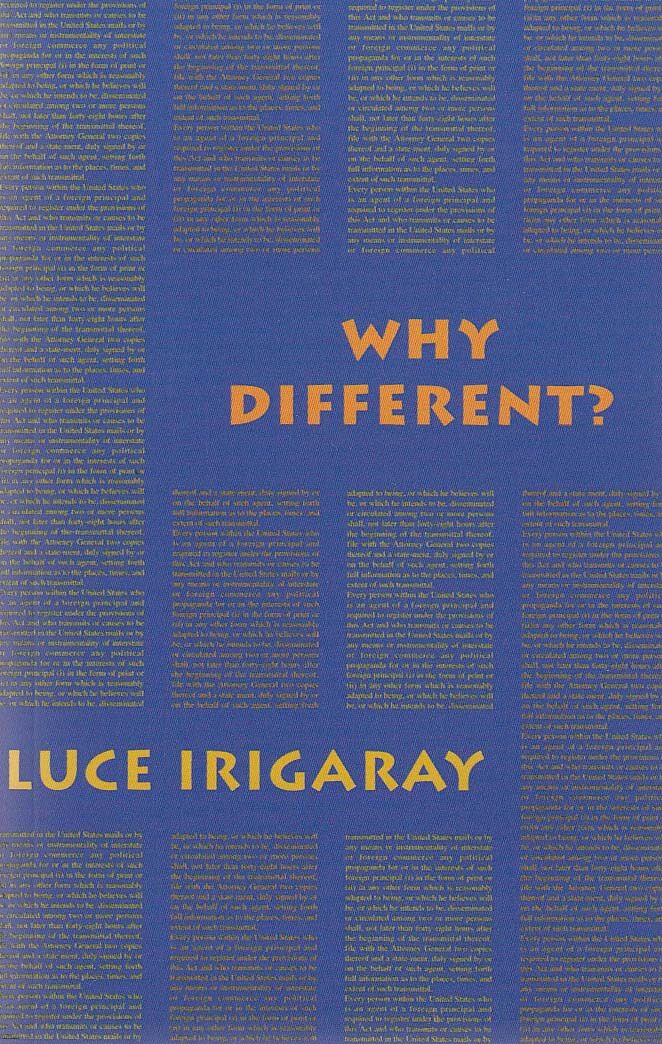Luce Irigaray
Luce Irigaray

The Way of Love
The Way of Love asks the question: How can we love each other? Here Luce Irigaray, one of the world's foremost philosophers, presents an extraordinary exploration of desire and the human heart. If Western philosophy has claimed to be a love of wisdom, it has forgotten to become a wisdom of love. We still lack words, gestures, ways of doing or thinking to approach one another as humans, to enter into dialogue, to build a world where we can live together.
Luce Irigaray is Director of Research in Philosophy at the Centre National de la Recherche Scientifique, Paris. A doctor of philosophy, Luce Irigaray is also trained in linguistics, philology, psychology and psychoanalysis. Now acknowledged as a key influential thinker of our times, her work focuses on the culture of two subjects, masculine and feminine - particularly through the liberation of a feminine subjectivity - something she explores in a range of literary forms, from the philosophical to the scientific, the political and the poetic.
Published 2004.

Why Different
A collection of interviews that deal explicitly with the relationship between daughter and mother, the sexuation of language, the symbolic order, and the importance of both history and philosophy for the liberation of the feminine subject.
For Luce Irigaray, one of the most original French feminist theorists, deconstructing the patriarchal tradition is not enough. She admits that it is not an easy task, but she believes that it is necessary to also define new values directly or indirectly suitable to feminine subjectivity and to feminine identity. She begins this project by analyzing and interpreting the absence of the feminine subject in the definition of dominant cultural values. She then wonders how these new values can be constructed without simply reversing the roles. Far from implying a hierarchy, difference affirms the coexistence and fruitful encounter of two different identities. These two heterogeneous identities, masculine and feminine, are not socially but ontologically constructed and describing the feminine requires establishing methods other than those already used by the masculine subject. Why Different? is a collection of interviews, conducted in both France and Italy, that deal explicitly with the relationship between daughter and mother, the sexuation of language, the symbolic order, and the importance of both history and philosophy for the liberation of the feminine subject. In Why Different? Irigaray elaborates on issues brought up in her other books, Speaking is Never Neutral, I Love to You, Thinking the Difference, and To Be Two and brings them to fruition.
Edited by Sylvère Lotringer.
Translated by Camille Collins.
And more

Our Grateful Dead: Stories of Those Left Behind
Vinciane Despret’s unique storytelling, woven with ethnography and family history, assembles accounts of those living their daily lives with their dead. She explores how the dead play an active, tangible role through those who are living, who might assume their place in a family or in society; continue their labor or art; or thrive from a shared inheritance or an organ donation.
Vinciane Despret is associate professor of philosophy at the University of Liège and the Free University of Brussels. The original French edition of Our Grateful Dead ( Au bonheur des morts) won the prestigious Prix des Rencontres Philosophiques de Monaco. Her books include What Would Animals Say If We Asked the Right Questions? and The Dance of the Arabian Babbler: Birth of an Ethological Theory, both from Minnesota.
Stephen Muecke is professor of creative writing at Flinders University, South Australia. His many translations include works by Gilles Deleuze, Roland Barthes, and Luce Irigaray.